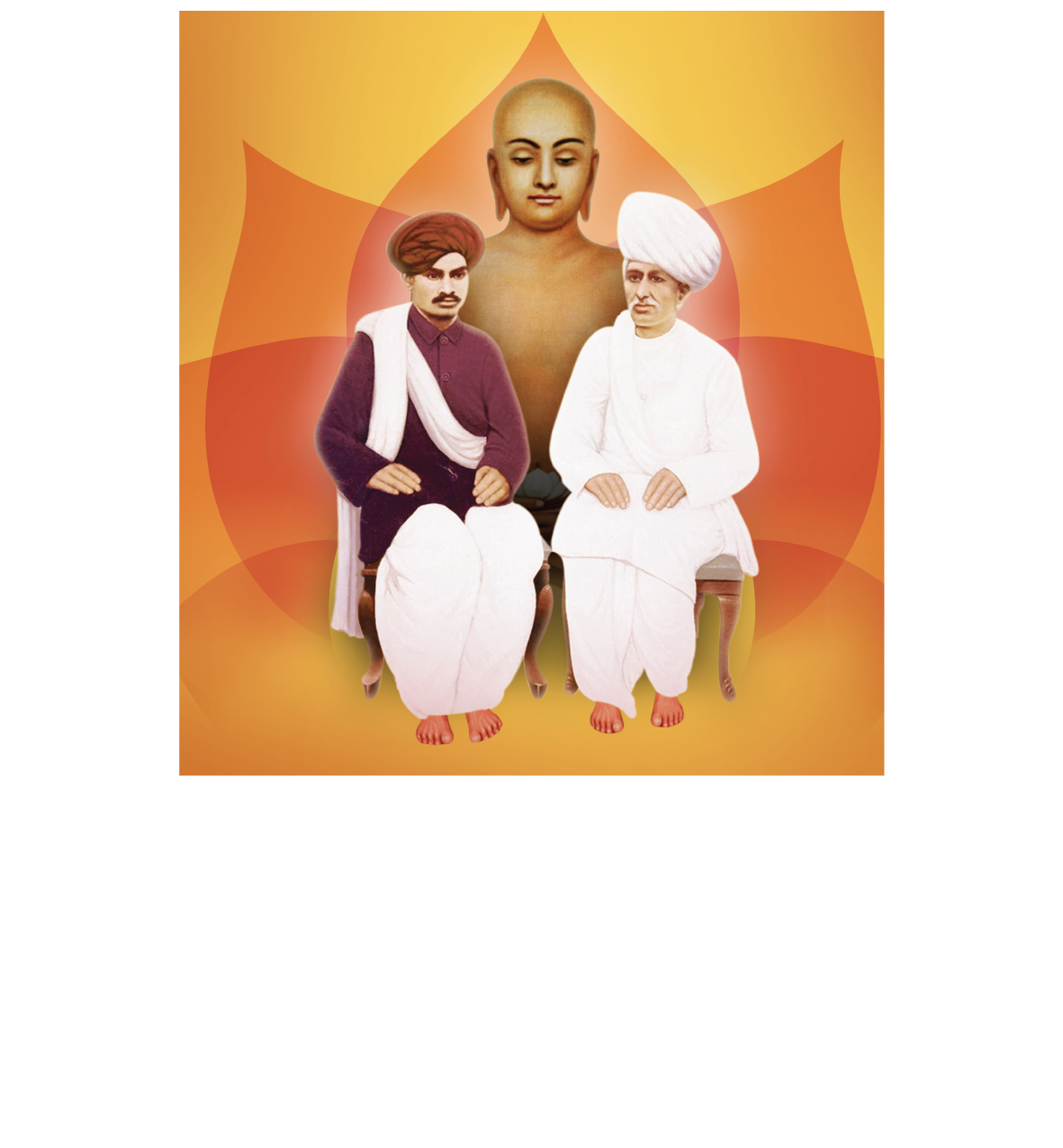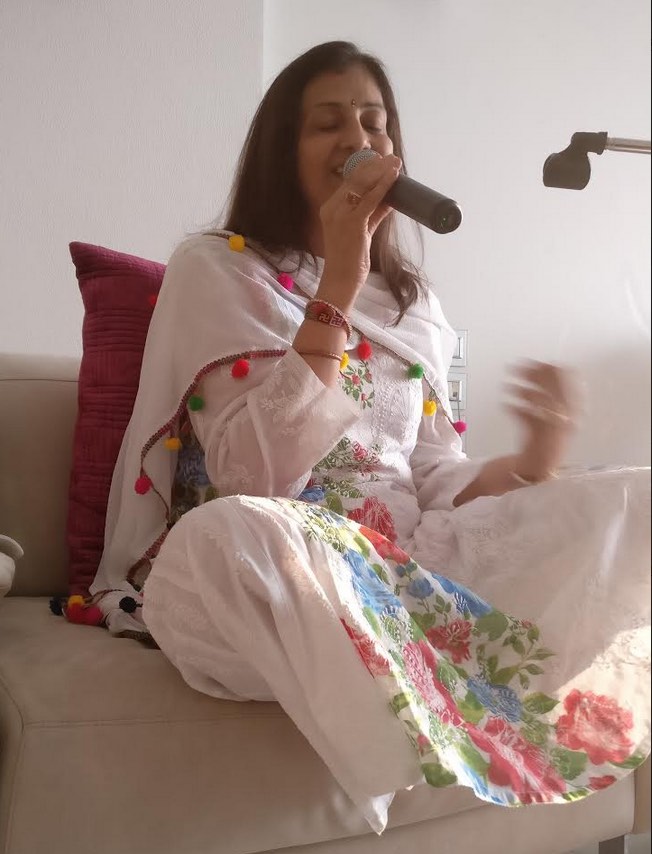“God could not be present everywhere, so he made mothers.”
Brahmnisht Minalben and Brahmnisht Vikrambhai paid homage to Lord Mahavir on his birthday during Aymbil Oli, and combined that with Mother’s Day. During the IVY class, they narrated 2 stories depicting Bhagwan Mahavir’s and Krupalu Dev’s love for their respective mothers.
Starting with an article written by Kumarpal Desai, Minalben quoted:
‘The world today is full of struggles, we are lost,
He found the true path for us to walk;
We are constantly burning in the fire of desire,
He gave us a new light.’
Minalben added that Pujya Bhaishree’s sharan keeps us worry-free; we are blessed to have the option to go to him with any problem. He will inevitably give us the strength to deal with them all.
When Lord Mahavir was only six and a half months old in mother Trishala’s womb, He felt the pain she was going through when he moved. So He decided to remain still as he did not wish to hurt any soul, especially his mother.
So while mother Trishala’s pain immediately stopped, she however started getting apprehensive, wondering whether her yet unborn child was harmed in any way? When there was no further movement, she feared for the life of her child and started crying due to extreme anxiety. When Bhagwan Mahavir, through Avadhigyaan, realized that he had inadvertently caused apprehension, he started moving again inside the womb, bringing immense relief to his mother. Our shastras describe, how Bhagwan Mahavir as a baby resolved then and there that he would not take diksha, until his parents were alive. Even the thought of any harm to her child, brought His mother immense pain, then how much more would she suffer if Bhagwan Mahavir proceeded to accept a life full of austerities?
Bhagwan Mahavir sent out 4 important messages:
- Matrubhakti
In his first discourse, Lord Mahavir preached the importance of loving your mother. He said a mother is the first birth.
- Respect
He propagated love and respect for all living beings, if you cannot give life, then you should not take anyone’s life. One’s happiness must not disturb that of another.
- Live and let live
The real enemies we face are within us, our desires and expectations. We must learn to live peacefully and let others live happily as well.
- Universal brotherhood
Bravery is not killing an elephant; it is saving an ant. All life forms have the same soul and experience the same pain as human beings.
As always, a page from ‘Pinnacle of Spirituality’ was read out. The lesson during this class was from an incident about Hemrajbhai and Malsibhai, who had come from Kutch to test young Shrimad’s skills, since they had heard so much about him.
At magistrate Dharsibhai’s house, Hemrajbhai and Malsibhai read out jumbled letters from a verse from Sanpatak. Shrimad attentively listened, rearranged the letters in his mind and recited them in proper order. The brothers were amazed at his intelligence, and realized that sending him to Kashi would not really benefit young Shrimad, as he was already wise and learned far beyond his years. Their offer to sponsor Shrimadji’s education in Kashi, including his family’s expenses was politely declined. Rather Shrimadji ensured that Dharsibhai facilitated their way back home to Kutch.
In the latter part of the swadhyay, Vikrambhai recounted an incident about a woman. She was trying to renew her driving license when she was asked of her profession. She replied saying she was a mother. The officer on the other side said there was no option reading ‘mother’, so he would classify her as a house wife. A few years later when she had to renew it again, the officer (a different one this time), again asked for her occupation? The answer this time was, “I am a researcher in the fields of child development, nutrition and interpersonal relationships.”
Impressed the officer asked her what was her actual profession? The woman replied, “My research projects are ongoing for a number of years, they are conducted in labs and on the field. I have two bosses, one is God and the other is my family. This topic is believed to be the most difficult part of sociology. My shift lasts for more than 14 hours daily, sometimes even 24 hours. It is tougher and more demanding than most professions. My remuneration is in terms of satisfaction and not money.” That day she had earned a small victory. No longer was she merely a mother, she was now a highly placed functionary for a service vital to mankind.
This is motherhood.
A mother plays the most important role; they build the character of nations. They are individuals who implant virtues and thus have an enormous responsibility.
It is very easy for us to be perceptive of hate and dislike, but when someone loves us for years, we fail to identify or recognize it in time.
Vikrambhai then sang a beautiful song written by Damodar Kushaldas Botadkar
“મીઠા મધુ ને મીઠા મેહુલા રે લોલ,
અતિ મીઠી એ મોરી માત રે
જનની ની જોડી સખી નહિ રે લોલ,
પ્રભુ ના એ પ્રેમની પુટડી રે લોલ,
જગ થી જુદરી એની જાત રે લોલ ,
અમિની ભરેલ એની આંખ રે લોલ
A mother is sweeter than honey, sweeter than the relief that the first showers of rain brings us. She represents God on Earth. He created her, because He cannot reach everyone at the same time.
Mothers personify true and pure love.
Shrimadji’s love for his mother can be perceived from the following two incidents:
Shrimadji had decided, at a very young age that he wanted to take diksha, and so, one day asked permission from his mother to renounce the world. She simply started crying inconsolably. She couldn’t bear the thought of him leaving her and leading an ascetic’s hard life. He realized how much his mother loved him and immediately told her, “Don’t cry, I will do as you say.”
When Shrimadji was on his death bed, he advised his brother, “Mansukh, do not be sad and take care of mother.”
We should learn the mukhya sutra, “I will do as you say” for everything our mothers tell us.
At the same time, a thousand mothers cannot equal a Guru. And thus, the faith we have for our Guru’s agna must also be multi-fold.
Vikrambhai then narrated some incidents from his own childhood.
“Everyone from our family went to New Era School, which had Gujarati as the medium of instruction, until grade 7. My mother wanted to put me in an English speaking school. St. Xavier’s was one such English school at that time, which required the student to pass a written entrance test. But we were late in taking the decision, and the academic year had already started 4 months ago, and there was no vacancy. In spite of being informed by the principal, my mother did not give up and would visit the school regularly. On the fifth visit, the Principal relented saying, ‘you have pursued and moved a mountain’. In this way, I was allowed to write the entrance exam for St. Xavier’s. Even as my way of entering the school was cleared, my mother noticed that there were large stuffed lions and elephant toys in the school, which might scare me. So she took me to the school twice before the exam, to ensure that I get accustomed and would not be afraid of the stuffed toys. After admitting me to an English-medium school, she ensured that I was fluent in spoken and written Gujarati. I was made to read the Mumbai Samachar everyday, teaching me all the Gujarati alphabetical letters.”
If we let them, mothers can be our best friends.

